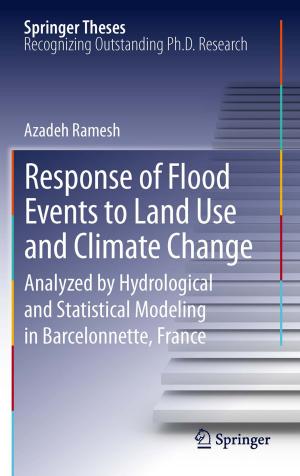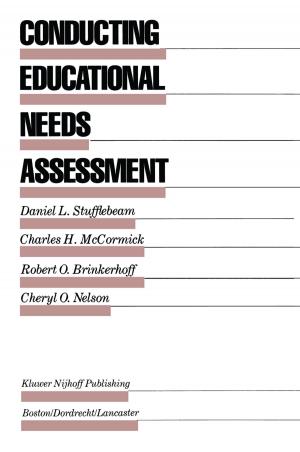Evidence-Based Approaches in Positive Education
Implementing a Strategic Framework for Well-being in Schools
Nonfiction, Reference & Language, Education & Teaching, Educational Theory, Educational Psychology, Social & Cultural Studies, Social Science, Sociology, Health & Well Being, Psychology| Author: | ISBN: | 9789401796675 | |
| Publisher: | Springer Netherlands | Publication: | May 8, 2015 |
| Imprint: | Springer | Language: | English |
| Author: | |
| ISBN: | 9789401796675 |
| Publisher: | Springer Netherlands |
| Publication: | May 8, 2015 |
| Imprint: | Springer |
| Language: | English |
Based on action research and implementation at one of the world’s great schools, this book provides a much-needed exploration of how to implement positive education at a whole school level. Evidence-Based Approaches in Positive Education summarises the integration of a whole-school mental health and well-being strategy, positive psychology programs and pastoral care models from 3 – 18 years of age. Positive education is the teaching of scientifically validated programs from positive psychology and character education that have an impact on student and staff well-being. It is an approach that focuses on teaching, building and embedding social and emotional learning throughout a student’s experience. St Peter’s College - Adelaide is the only institution in the world to integrate Martin Seligman’s well-being theory throughout all aspects of both its strategic intent and positive education programs. The School’s vision is to be a world-class school where all boys flourish. Its mission is to provide an exceptional education that brings out the very best in every boy. This is done within an intellectually and spiritually rich environment that nurtures international-mindedness, intercultural understanding, respect and a commitment to social justice. This book captures the developments of the St Peter’s College journey. It focuses on the integration of well-being across seven strategic goals: Academics; Well-being; Student Life; Entrepreneurship; Innovation and Partnerships; People, Culture and Change; Sustainability and Environment; Community Engagement, Advancement, and Philanthropy. A uniquely Australian school, the impact of a St Peter’s College education is to build great men: who believe safety, service and integrity and fundamental parts of their lives; who are active members of communities that are socially and culturally diverse; who engage in political, ethical, and environmental challenges as good citizens. Since 1847, St Peter’s College alumni have had global and life-changing impact in all fields of human endeavour. The School’s alumni include three Nobel Laureates, 42 Rhodes Scholars, Olympians and Archbishops, artists and scientists, educators and journalists, actors and politicians, philanthropists and physicians, CEOs, diplomats and soldiers, explorers, painters and poets. This book shares evidence-based practices and makes a substantial contribution to the rapidly developing field of positive psychology and its application in schools.
Based on action research and implementation at one of the world’s great schools, this book provides a much-needed exploration of how to implement positive education at a whole school level. Evidence-Based Approaches in Positive Education summarises the integration of a whole-school mental health and well-being strategy, positive psychology programs and pastoral care models from 3 – 18 years of age. Positive education is the teaching of scientifically validated programs from positive psychology and character education that have an impact on student and staff well-being. It is an approach that focuses on teaching, building and embedding social and emotional learning throughout a student’s experience. St Peter’s College - Adelaide is the only institution in the world to integrate Martin Seligman’s well-being theory throughout all aspects of both its strategic intent and positive education programs. The School’s vision is to be a world-class school where all boys flourish. Its mission is to provide an exceptional education that brings out the very best in every boy. This is done within an intellectually and spiritually rich environment that nurtures international-mindedness, intercultural understanding, respect and a commitment to social justice. This book captures the developments of the St Peter’s College journey. It focuses on the integration of well-being across seven strategic goals: Academics; Well-being; Student Life; Entrepreneurship; Innovation and Partnerships; People, Culture and Change; Sustainability and Environment; Community Engagement, Advancement, and Philanthropy. A uniquely Australian school, the impact of a St Peter’s College education is to build great men: who believe safety, service and integrity and fundamental parts of their lives; who are active members of communities that are socially and culturally diverse; who engage in political, ethical, and environmental challenges as good citizens. Since 1847, St Peter’s College alumni have had global and life-changing impact in all fields of human endeavour. The School’s alumni include three Nobel Laureates, 42 Rhodes Scholars, Olympians and Archbishops, artists and scientists, educators and journalists, actors and politicians, philanthropists and physicians, CEOs, diplomats and soldiers, explorers, painters and poets. This book shares evidence-based practices and makes a substantial contribution to the rapidly developing field of positive psychology and its application in schools.















